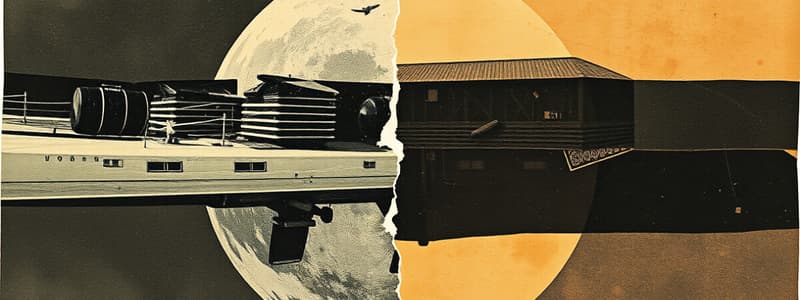Podcast
Questions and Answers
What is a phase change?
What is a phase change?
A phase change is the reversible physical change that takes place when a substance changes from one state of matter to another.
What is freezing?
What is freezing?
- Liquid to gas
- Liquid to solid (correct)
- Solid to liquid
- Gas to solid
What is sublimation?
What is sublimation?
- Solid to gas (correct)
- Liquid to solid
- Solid to liquid
- Gas to liquid
What is condensation?
What is condensation?
What is melting?
What is melting?
What is deposition?
What is deposition?
What is vaporization?
What is vaporization?
What happens to the temperature of a substance during a phase change?
What happens to the temperature of a substance during a phase change?
The temperature at which a substance freezes is lower than the temperature at which it melts.
The temperature at which a substance freezes is lower than the temperature at which it melts.
What describes the behavior of a substance during a phase change?
What describes the behavior of a substance during a phase change?
A substance absorbs energy from its surroundings during a(n) _________ change.
A substance absorbs energy from its surroundings during a(n) _________ change.
The energy absorbed by one gram of ice as it melts is known as the _____________ for water.
The energy absorbed by one gram of ice as it melts is known as the _____________ for water.
As water freezes, it releases heat to its surroundings. Freezing is an example of a(n) _________ change.
As water freezes, it releases heat to its surroundings. Freezing is an example of a(n) _________ change.
Water molecules have a more orderly arrangement in ice than in liquid water.
Water molecules have a more orderly arrangement in ice than in liquid water.
When liquid water freezes, the average kinetic energy of its molecules ___________, and the arrangement of molecules becomes more orderly.
When liquid water freezes, the average kinetic energy of its molecules ___________, and the arrangement of molecules becomes more orderly.
Vaporization is the phase change in which a substance changes from a(n) _______ into a(n) ________.
Vaporization is the phase change in which a substance changes from a(n) _______ into a(n) ________.
The energy absorbed by one gram of water as it changes from its liquid phase into water vapor is known as the _____________________ for water.
The energy absorbed by one gram of water as it changes from its liquid phase into water vapor is known as the _____________________ for water.
When water vapor collects above the liquid in a closed container, the pressure caused by the collisions of this vapor and the walls of the container is called vapor pressure.
When water vapor collects above the liquid in a closed container, the pressure caused by the collisions of this vapor and the walls of the container is called vapor pressure.
The phase change in which a substance changes from a gas into a liquid is called _____________.
The phase change in which a substance changes from a gas into a liquid is called _____________.
A gas absorbs energy as it changes into a liquid.
A gas absorbs energy as it changes into a liquid.
Dry ice can change directly from a solid to a gas without forming a liquid first. This process is an example of _____________.
Dry ice can change directly from a solid to a gas without forming a liquid first. This process is an example of _____________.
What is deposition?
What is deposition?
Flashcards are hidden until you start studying
Study Notes
Phase Changes Overview
- A phase change is a reversible physical transformation where a substance shifts between states of matter (solid, liquid, gas).
Types of Phase Changes
- Freezing: Transition from liquid to solid.
- Sublimation: Transition from solid to gas without passing through a liquid state.
- Condensation: Transition from gas to liquid.
- Melting: Transition from solid to liquid.
- Deposition: Transition from gas directly to solid, skipping the liquid phase.
- Vaporization: Transition from liquid to gas.
Temperature Behavior
- During a phase change, the temperature of the substance remains constant despite energy exchange.
- The melting point and freezing point of a substance are the same, making the statement "the temperature at which a substance freezes is lower than the temperature at which it melts" false.
Energy Transfer
- A substance either absorbs or releases energy during phase changes.
- Endothermic change: Energy is absorbed from the surroundings.
- Exothermic change: Energy is released to the surroundings.
Specific Heat Values
- The heat of fusion for water: The energy absorbed by one gram of ice as it melts.
- The heat of vaporization for water: The energy absorbed by one gram of liquid water to transform into water vapor.
Molecular Arrangements
- In ice, water molecules exhibit a more orderly arrangement compared to liquid water.
- Freezing results in a decrease in average kinetic energy and an orderly molecular structure.
Additional Insights
- Vaporization occurs when a substance transitions from liquid to gas.
- Vapor pressure is defined as the pressure from vapor molecules colliding with the walls of a closed container.
- When gas turns into a liquid, it does not absorb energy; this statement is false.
- Dry ice illustrates sublimation, as it transitions from solid to gas directly without forming a liquid.
Studying That Suits You
Use AI to generate personalized quizzes and flashcards to suit your learning preferences.




